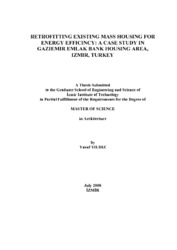Please use this identifier to cite or link to this item:
https://hdl.handle.net/11147/3948Full metadata record
| DC Field | Value | Language |
|---|---|---|
| dc.contributor.advisor | Durmuş Arsan, Zeynep | - |
| dc.contributor.author | Yıldız, Yusuf | - |
| dc.date.accessioned | 2014-07-22T13:52:48Z | - |
| dc.date.available | 2014-07-22T13:52:48Z | - |
| dc.date.issued | 2008 | - |
| dc.identifier.uri | http://hdl.handle.net/11147/3948 | - |
| dc.description | Thesis (master)--İzmir Institute of Technology, Architecture, İzmir, 2008 | en_US |
| dc.description | Includes bibliographical references (leaves: 101-109) | en_US |
| dc.description | Text in English; Abstract: Turkish and English | en_US |
| dc.description | xv, 142 leaves | en_US |
| dc.description.abstract | Energy consumption in the extant residential building stock of Turkey is excessive owing to an inadequate regulative framework regarding energy-efficient retrofitting, application deficiency and failures in heating insulation detailing regulated by TS 825 Thermal Insulation in Buildings. Mechanical systems through the operation period of buildings are out of inspection and occupant profile pays attention to size rather than the quality of construction. In the framework of research concerning harmonization with the EU, the building regulations of Turkey have been adapted to the EU Directives promoting energy efficiency and reduction of energy demand in existing buildings. The Turkish Energy Efficiency Law, launched in 2007 in this framework, is the most noteworthy step. In the light of retrofitted housing examples from 11 EU countries, the thesis presents effective and case-specific retrofitting scenarios for a selected residential block in Gaziemir Emlak Bank Mass Housing Area in Izmir, Turkey. The objective is to draw attention to the enormous potential for reducing energy consumption in existing mass housing areas through implementation of energy-efficient retrofitting applications. The thesis discusses scenarios to decrease the energy demand for heating and evaluates the effects of predefined scenarios on cooling loads of selected apartment block. The building energy analysis software, Ecotect v5.50, has been used for the assessment of heating and cooling energy loads based on the current and improved conditions of the building. The thesis demonstrates that it is possible to save almost half of the annual energy consumption of the residential block in Gaziemir Emlak Bank Mass Housing Area by applying appropriate retrofitting scenarios. | en_US |
| dc.language.iso | en | en_US |
| dc.publisher | Izmir Institute of Technology | en_US |
| dc.rights | info:eu-repo/semantics/openAccess | en_US |
| dc.subject.lcc | NA2542.3.T9 Y514 2008 | en |
| dc.subject.lcsh | Architecture and energy conservation--Turkey | en |
| dc.subject.lcsh | Energy consuption | en |
| dc.subject.lcsh | Insulation (Heat)--Economic aspects | en |
| dc.title | Retrofitting Existing Mass Housing for Energy Efficincy: a Case Study in Gaziemir Emlank Bank Housing Area, Izmir, Turkey | en_US |
| dc.type | Master Thesis | en_US |
| dc.institutionauthor | Yıldız, Yusuf | - |
| dc.department | Thesis (Master)--İzmir Institute of Technology, Architecture | en_US |
| dc.relation.publicationcategory | Tez | en_US |
| dc.identifier.wosquality | N/A | - |
| dc.identifier.scopusquality | N/A | - |
| item.openairecristype | http://purl.org/coar/resource_type/c_18cf | - |
| item.languageiso639-1 | en | - |
| item.openairetype | Master Thesis | - |
| item.grantfulltext | open | - |
| item.fulltext | With Fulltext | - |
| item.cerifentitytype | Publications | - |
| Appears in Collections: | Master Degree / Yüksek Lisans Tezleri | |
Files in This Item:
| File | Description | Size | Format | |
|---|---|---|---|---|
| T000746.pdf | MasterThesis | 4.02 MB | Adobe PDF |  View/Open |
CORE Recommender
Page view(s)
274
checked on Mar 31, 2025
Download(s)
212
checked on Mar 31, 2025
Google ScholarTM
Check
Items in GCRIS Repository are protected by copyright, with all rights reserved, unless otherwise indicated.